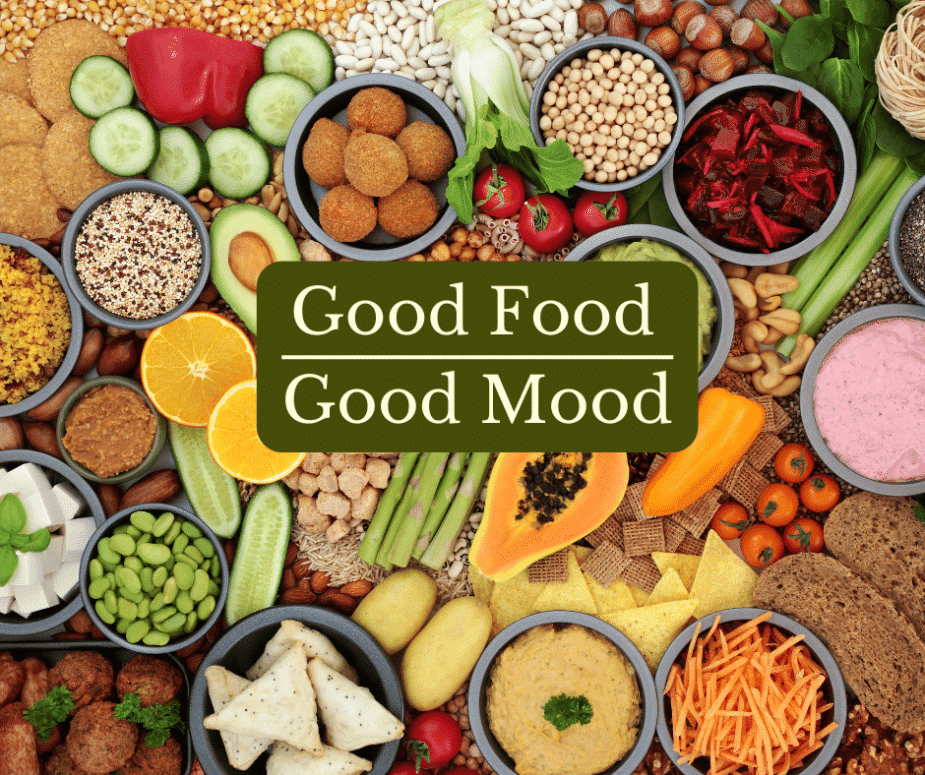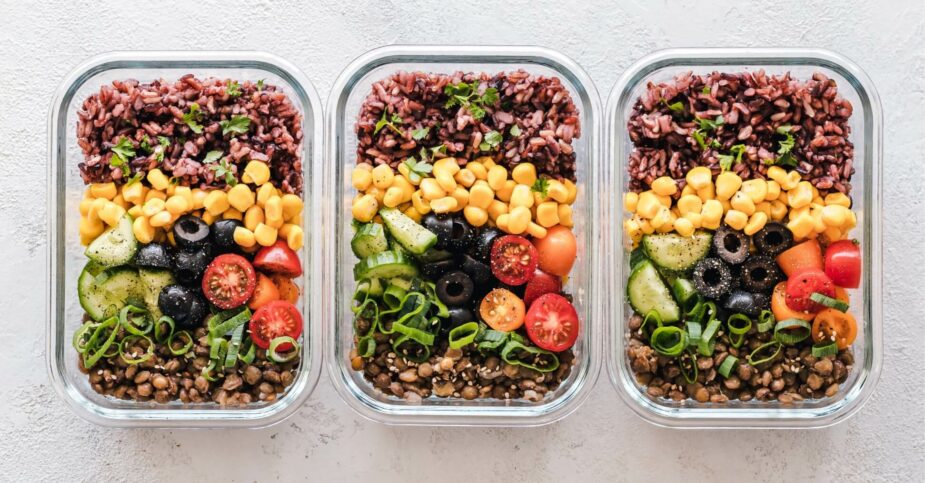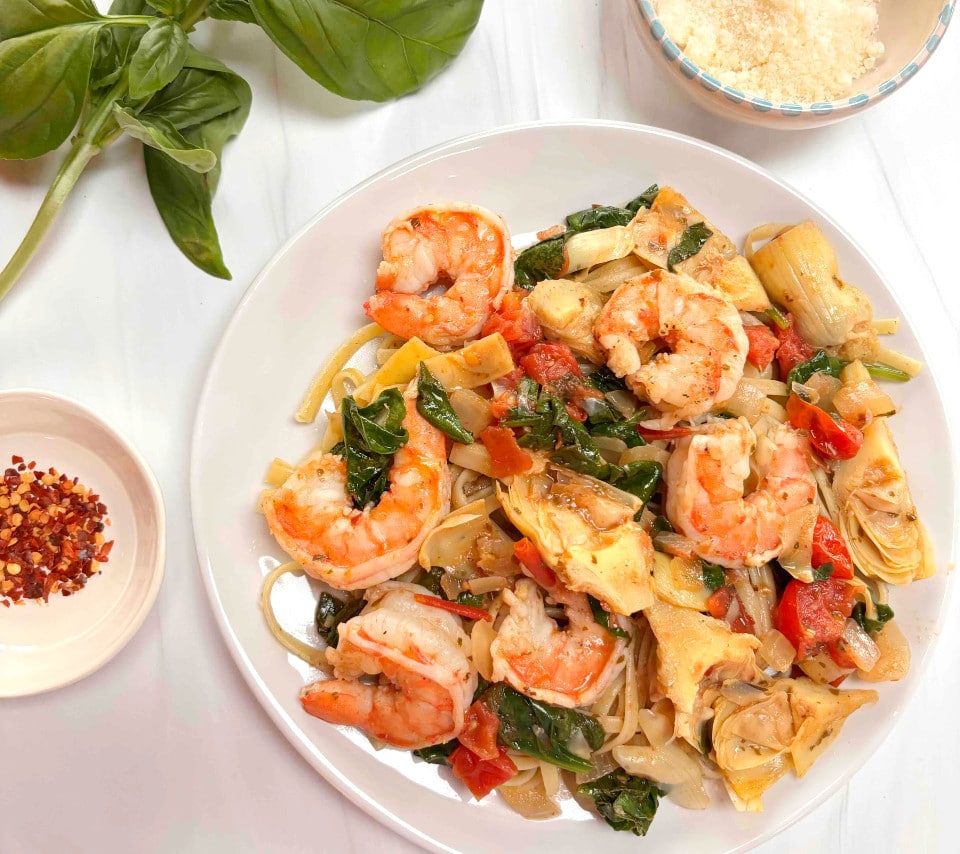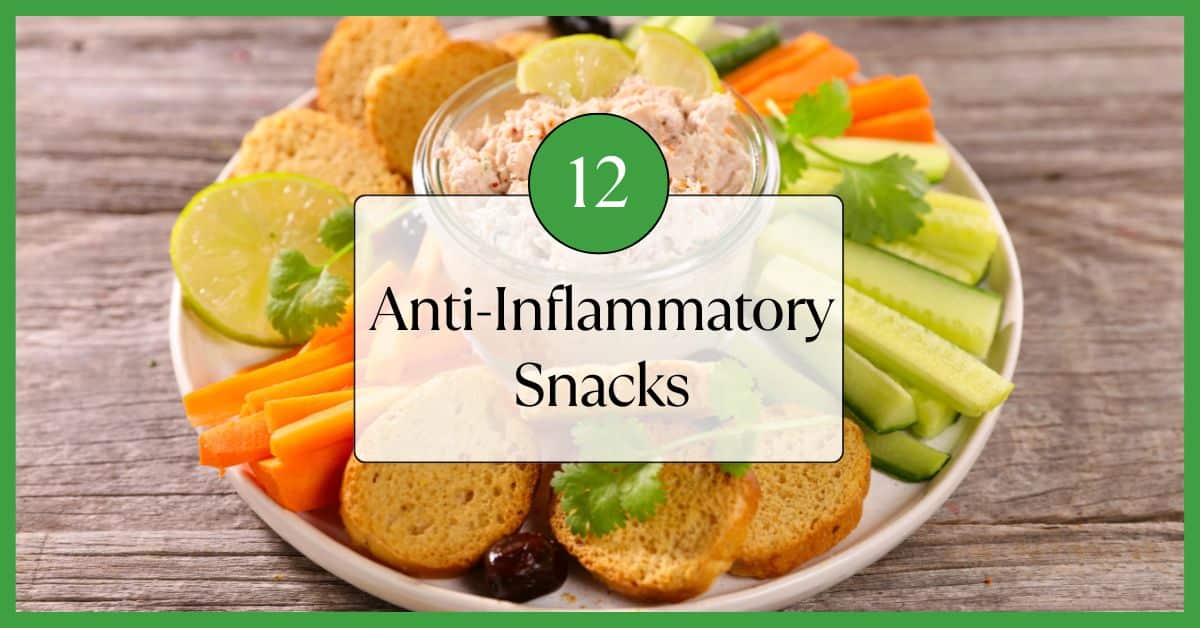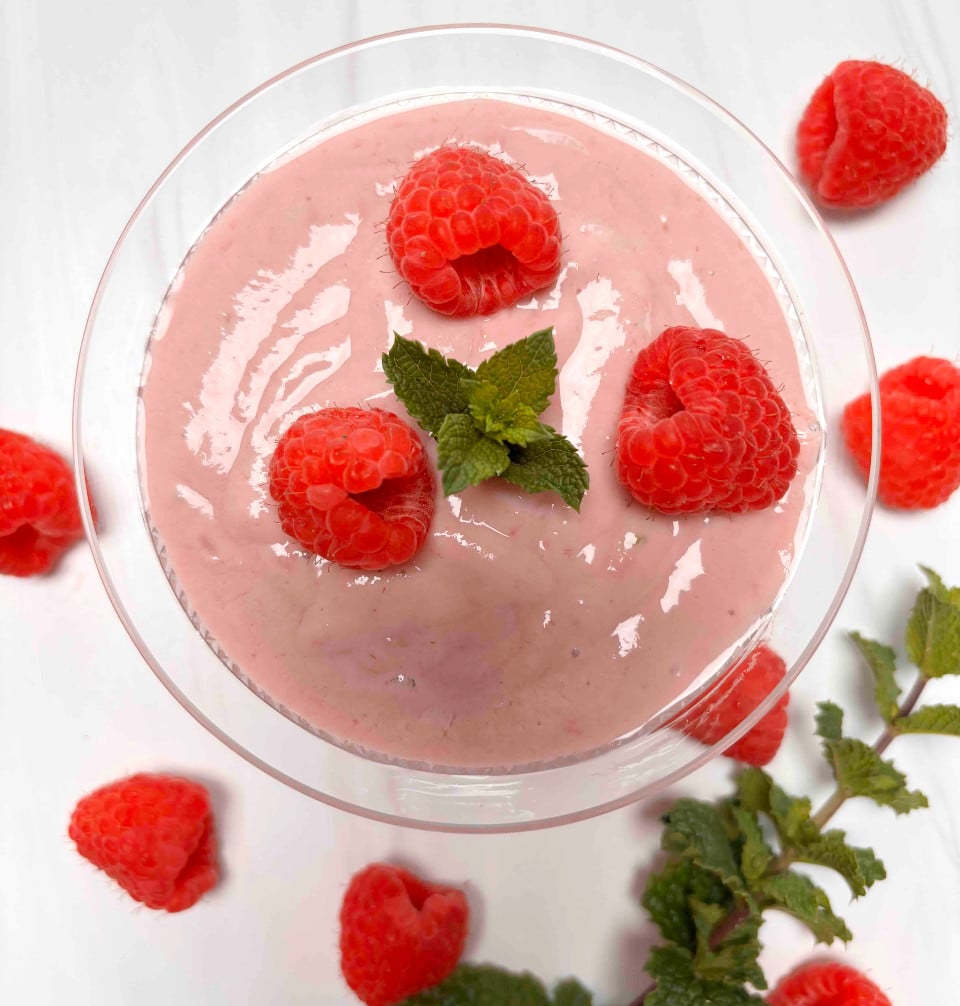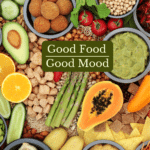I know this won’t surprise you – we all have up and down days. It’s a part of life. But what might surprise you is that what you eat on a regular basis can have a big impact on how you feel. Yup, food can boost, or tank your mood.
Interesting, right? Foods have specific nutrients that can actually improve how our brain feels and functions. I’ll be telling you exactly which foods may help boost your mood in this post.
Hi, I’m Laura, a registered dietitian nutritionist and the author of MIND Diet for Two (this is an affiliate link). A cookbook all about how to boost your brain health. It’s safe to say that I know how food impacts our brains. And it’s true, what we eat impacts how we feel.
Now, please keep in mind, I am a registered dietitian, but I am not YOUR dietitian. I am also not a doctor. The information provided here is for informational purposes only. You should always talk with your own healthcare provider for support when making changes to optimize your health and wellness (and mood!).
With that said, let’s take a look at how food may affect our moods and how making small tweaks to your meals and snacks may give you that extra little boost you are looking for!
Table of Contents
How Does Food Affect Your Mood?
So how does food affect our mood? Have you ever indulged in a big plate of pancakes and bacon with maybe a side of home fries on a weekend morning? Special treat! And wow, that should make you feel great! After all, it tastes so good and is not something you eat every day.
But what really happens after that? You head home and crash on the couch!
Yup, it tasted great at the time, but man are you wiped out.
Maybe you put two and two together and realized that admittedly delicious breakfast brought you down a bit. It was loaded with carbs and fat and to be honest, not a lot of brain-boosting nutrients.
What is probably less memorable is how you felt after having say a bowl of yogurt topped with fresh berries for breakfast. A bit more energetic? Ready to tackle the day?
While definitely a lower-fat breakfast choice, the nutrients in that yogurt breakfast are playing an important role in waking up your brain. In contrast, what is in that more indulgent breakfast is putting it to sleep!
Let’s dive into some foods and nutrients that boost your mood.
Foods and Nutrients That Are Good For Your Mood
There are a variety of foods and nutrients that are great for brain health and may have a role in helping to regulate our mood. Probiotics, omega-3 fatty acids, antioxidants, fiber, and protein are just a few. They are found in all kinds of foods and many are the same that support brain health and may help prevent or delay the onset of dementia.
Boost your mood and feel better now…prevent or delay dementia later – a win/win!
10 Best Foods to Help Boost Your Mood
These are my top ten foods to help boost your mood, starting with fresh (or frozen) berries!
1) Berries
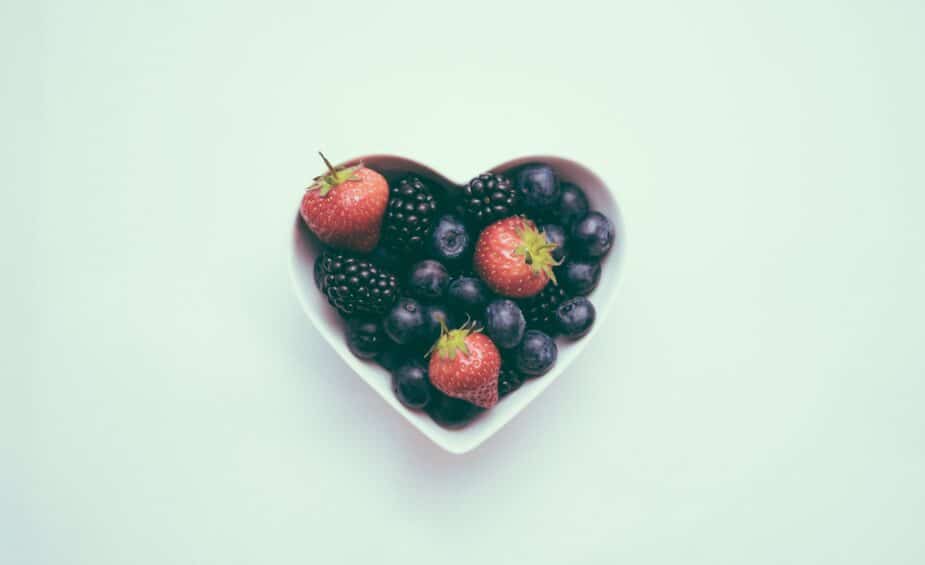
One of the best things about berries is their ability to keep blood flowing freely through your brain and reduce inflammation. Yes, really! Berries are rich in antioxidants and vitamins that help reduce oxidation and inflammation.
What does that mean for you? Oxidative stress can destroy brain cells, cause inflammation in your brain, and lead to plaque accumulation. Research has shown some people with depressive symptoms have high levels of oxidation and inflammation in their brains.
The good news? Antioxidants, called flavonoids that are found in berries can help reduce and repair cell damage and decrease that pesky inflammation and may help reduce anxiety and feelings of depression.
A recent meta-analysis found higher intakes of fruits and vegetables, specifically berries, citrus fruits, and green leafy vegetables, improved optimism, and reduced psychological distress.
Berries are rich in potassium which can help keep our blood pressure in check too.
A berry smoothie first thing in the morning or berries on top of yogurt or oatmeal is a great way to get your day off to a good start.
2) Whole Grains
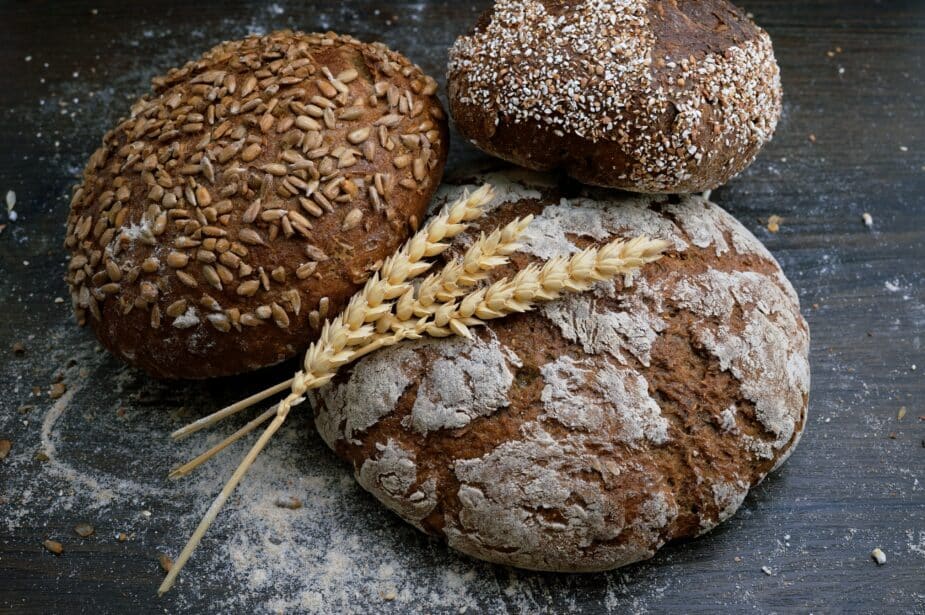
Whole grains, or unrefined grains, are rich in B vitamins that help with energy production and stimulate the neurotransmitters in our brains.
What are neurotransmitters? They are the messengers that transmit signals from our brains to every nook and cranny of our bodies. It’s like our very own brain internet, connecting the dots and keeping things running smoothly.
If we are low in B vitamins, we may feel anxious. Some studies have shown that people with higher levels of B vitamins, including thiamine, niacin, and pantothenic acid had lower rates of anxiety. They have also found people with higher intakes of biotin and B6 had lower levels of stress and depression.
So, having enough of the B-complex vitamins that are readily available in whole-grain foods helps to keep your brain and body feeling good! Give my Dried Cherry Scones or Quinoa Salad a try for a couple of delicious ways to add some more whole grains to your day.
3) Seafood
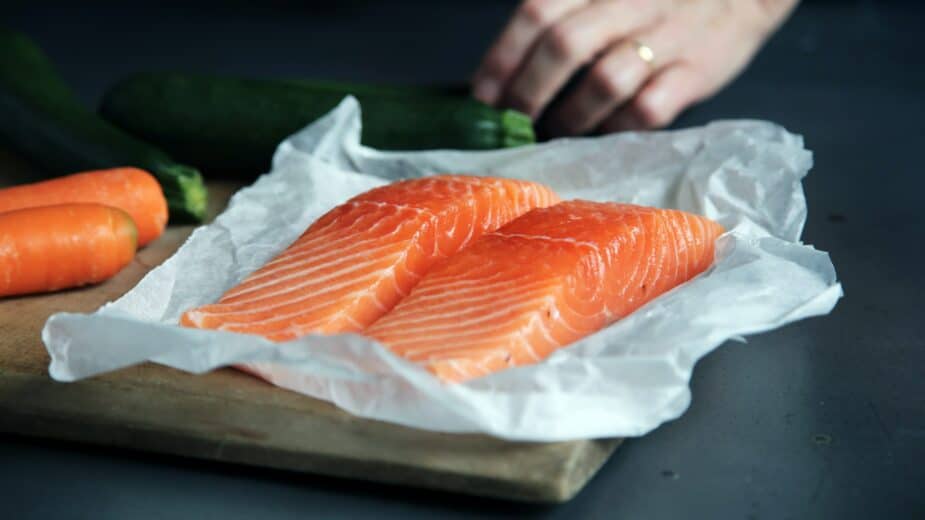
You probably know that fatty fish like salmon and tuna are rich in heart-healthy omega-3s. While we’ve known about their benefits to heart and brain health, did you know eating seafood has been linked to lower levels of depression?
While more research is needed, observational research has shown that people who eat more seafood have lower rates of depression. And if you don’t usually eat fish, you can start today and see mood-boosting benefits. In this study, those with mild depression who started including seafood also experienced reduced symptoms.
A couple of servings a week is all you need. Add some tuna to your lunchtime salad, grill up a salmon filet or if you’re worried about cooking fish at home, order it when you go out! I love adding salmon to a grain bowl like my Teriyaki Salmon Rice Bowl recipe.
4) Leafy Greens
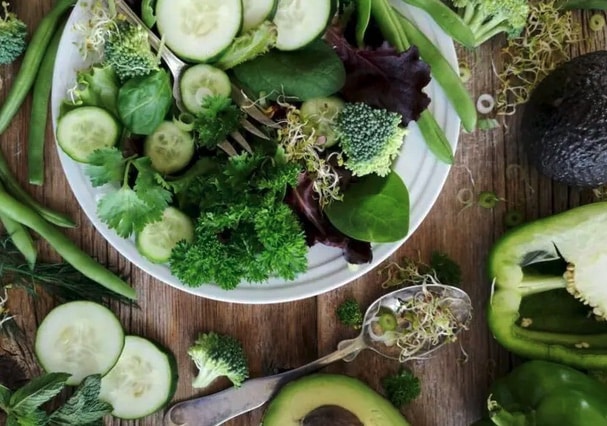
It’s not just kale that plays here. All types of dark leafy greens like spinach, collards, chard, and bok choy are full of vitamin K, carotenoids, potassium, and fiber. Six servings a week are recommended to help reduce the risk of dementia, but what about how they affect your mood?
The same study that linked a higher intake of berries to increased feelings of optimism found the same mood benefit with higher intakes of green leafy vegetables too.
Adding chopped spinach and kale to lentils or couscous as a side dish, or mixing bok choy into a stir fry or Asian-style soup like my Thai Red Curry and Sweet Potato Soup are simple and delicious ways to mix leafy greens into your meals.
5) Nuts
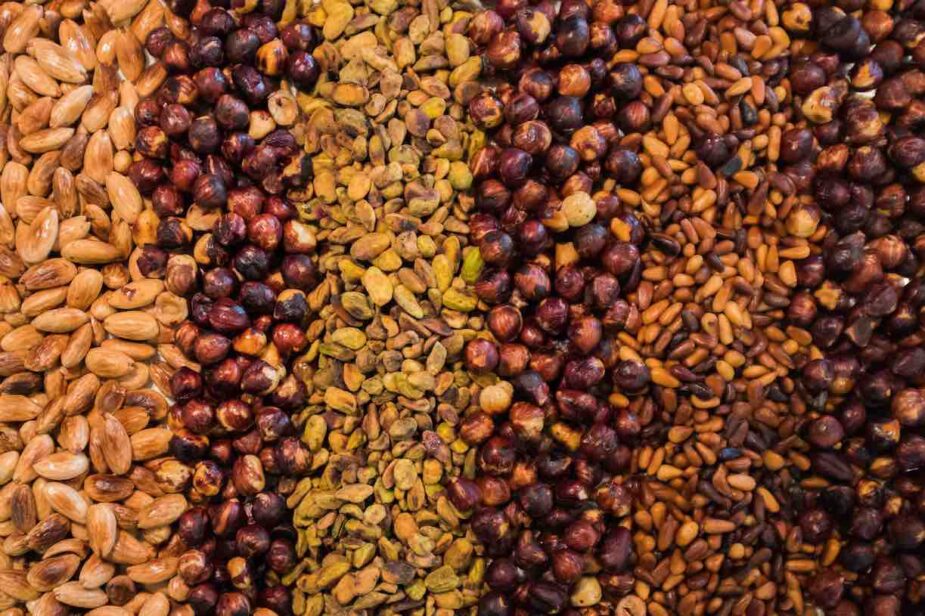
Did you know nuts contain a high amount of tryptophan, a hormone that helps release serotonin – that “feel good” hormone that is known to keep you calm, reduce stress and yes, boost your mood?
A recent study evaluated the effects of eating a Mediterranean-style diet with extra nuts. They found those who supplemented with extra nuts, in addition to following the other principles of the Mediterranean diet had a 20 to 30% reduced risk of developing depression over a 5 ½ year period.
The best way to add nuts? Keep in mind, a little is all you need. Nuts are high in calories and fat. While healthy fat, it’s best to keep it to a serving a day.
A serving of nuts is only ¼ cup. I love to add some to my morning yogurt or mix them into salads or on top of a grain bowl for some added crunch. Of course, a handful as an afternoon snack is always great too!
Check out my recent post about nuts and brain health for more ideas too!
6) Healthy Oils
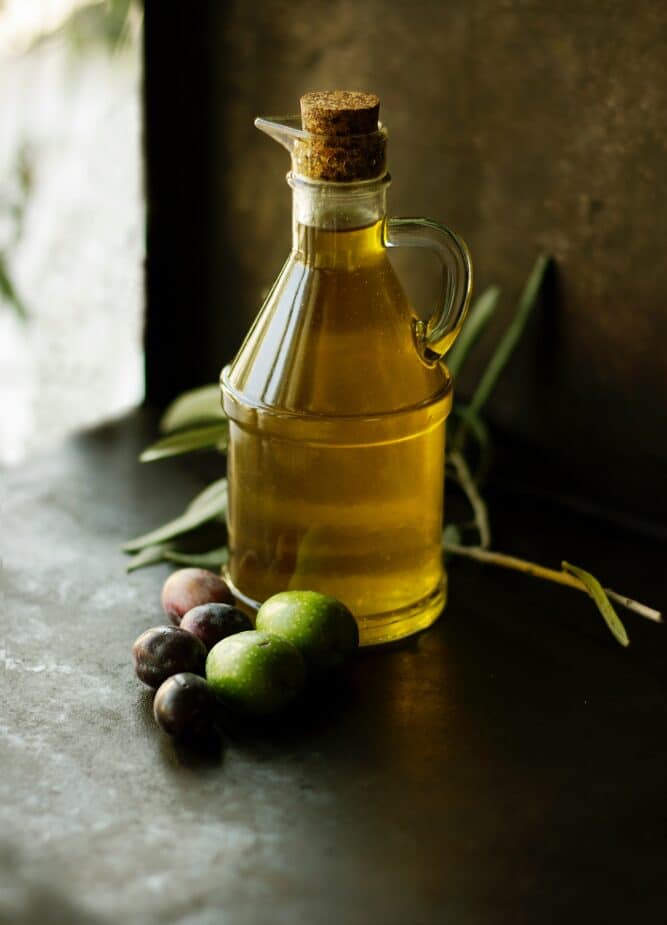
Oils that are rich in healthy fats called monounsaturated fats help reduce inflammation in our brains and blood vessels. What does this have to do with our mood?
While it’s difficult to give olive oil all the credit here, a study in Australia looked at the Mediterranean diet with 3 tablespoons of olive oil daily in adults with depression compared to adults who just received social support. Those following the Mediterranean-style diet with olive oil reported significant improvement in symptoms after 12 weeks compared to mild improvement in those in the social support group.
One possible explanation for these results is that olive oil is rich in phenols that help reduce oxidation in the brain. Phenols are the compounds in olive oil that give it its characteristic “bite” or flavor, and health boost to boot.
There is also some evidence that avocado oil may help reduce cortisol levels in some people. Chronic stress can increase cortisol levels causing oxidation in your brain. This may lead to an increased risk of depression and anxiety. Findings have shown that avocado oil may counteract the effects of cortisol.
7) Fermented Foods
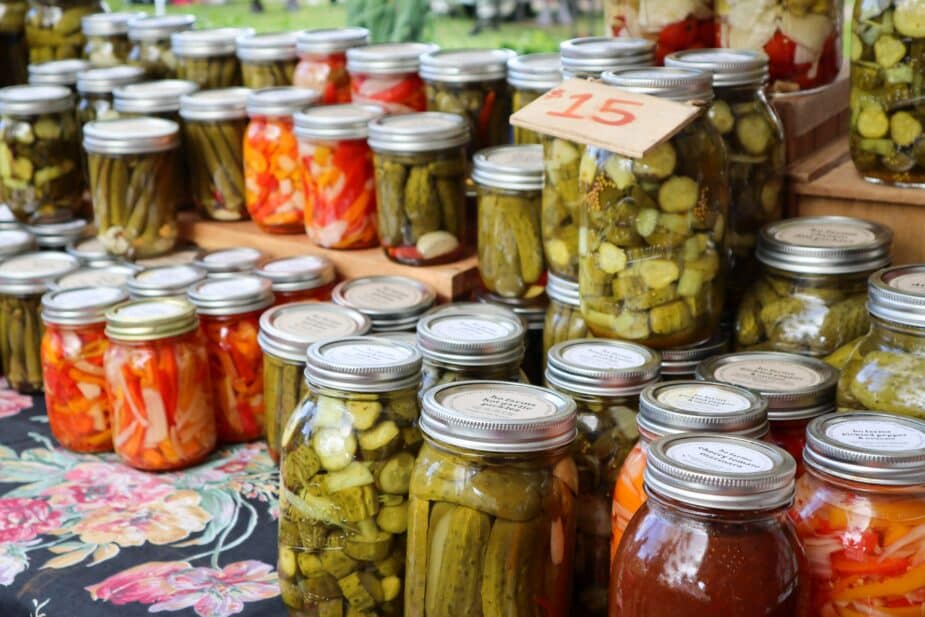
Research has shown that probiotics found in fermented foods like kefir and miso support our gut microbiome. Why is this important for your mood? Your microbiome is a direct communication channel with your brain and influences your mood.
How does this work? The bacteria in our GI tracts help regulate some of the nerve cells in our brains. One is called GABA, which is an amino acid found in our nervous system. It helps keep us calm and seems to lower anxiety. Some bacteria, especially many of the lactobacillus strains found in fermented foods help regulate this important amino acid.
Other bacteria help regulate our serotonin levels. That “feel-good” hormone is actually found in our gut as well as our brain. As a matter of fact, 95% of the serotonin in our body is made in our GI tract. Research suggests that bacteria are required to produce serotonin. Probiotics are an important part of that and have been found to help reduce feelings of depression and anxiety.
So, enjoy some Greek yogurt for breakfast. And yes, you ARE sensing a pattern here! I’m recommending yogurt again! But there are other ways to add fermented foods too. Try adding some miso to a salad dressing, or enjoy some sauerkraut or pickles with your dinner or a smoothie made from kefir and let that good bacteria feed your good mood!
What about sourdough? While the starter is loaded with healthy bacteria, they actually don’t survive once they are heated. While the bacteria may not be alive, the bread still contains lots of prebiotics – the food the bacteria in your GI tract need to survive. So, enjoy a slice of sourdough bread, or pancakes for breakfast. Just know it’s feeding the bacteria that are fueling your good mood!
8) Dark Chocolate

Feeling low or down in the dumps? A small piece of chocolate may do the trick. Chocolate contains flavonoids. These nutrients are a type of antioxidant that are also found in berries and help reduce inflammation. They also trigger the release of the neurotransmitters, or chemical messengers in our brain which help regulate our emotions and make us feel content and happy.
These compounds act quickly too. It appears that they are absorbed and may get to our brains within about 30 minutes. They are at their highest levels about 2 – 3 hours later and stay in our system for 6 – 8 hours. So your chocolate is not just a quick fix either!
The other way chocolate may work is in helping to release more serotonin – you may know it as the “feel good hormone.”
The carbohydrates found in chocolate are what are at play here. They help increase our tryptophan levels, the hormone we first mentioned in the nut section above.
Tryptophan is a hormone that helps produce serotonin, otherwise known as the “feel good” hormone. Some studies have shown that higher serotonin levels have been associated with a better mood while lower levels have been associated with the blues.
Finally, dark chocolate in particular seems to have the biggest impact. Research has shown it may be due to that all-important gut-brain communication system too. Dark chocolate also seems to have some prebiotic effects, helping to feed the healthy bacteria in our GI tract. This keeps the communication flowing between our gut and brain.
While there is still a lot to understand about how and why chocolate seems to improve our mood, if you need a pick-me-up, a small piece of dark chocolate, about an ounce or two (think 1 or 2 squares of Ghirardelli chocolate – one of my favs!), is probably just enough to give you a little boost. Look for chocolate that is at least 70% cacao.
Try my Dark Chocolate Hazelnut Granola or Dark Chocolate Orange Mousse.
9) Eggs
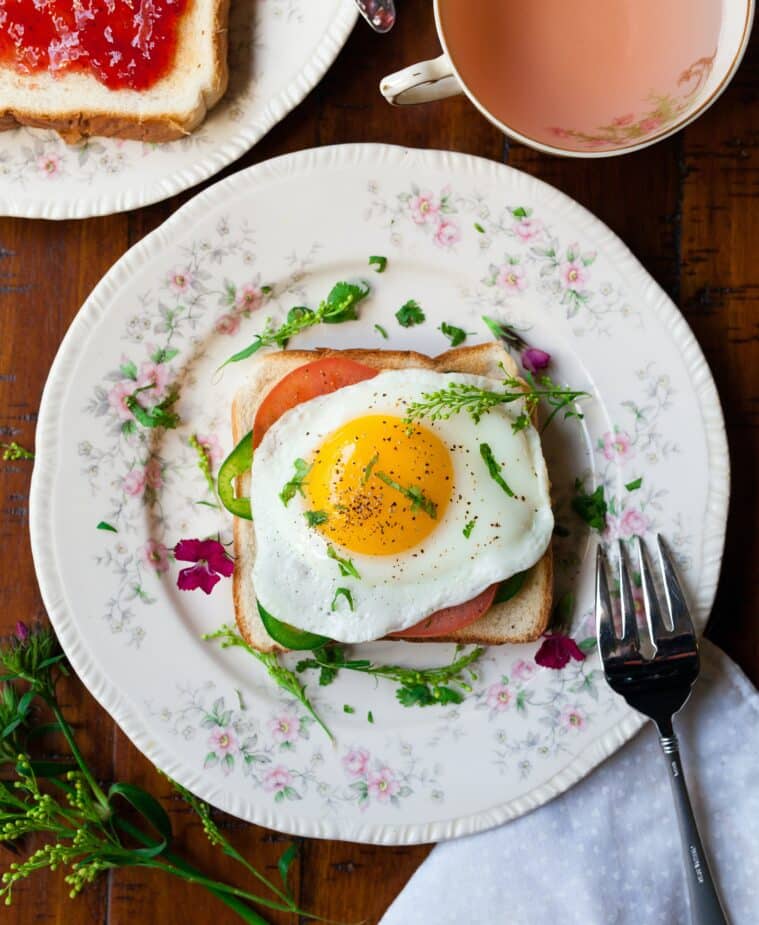
Shunned in the past, eggs are now known to have vital nutrients for our overall health. They are rich in choline, an essential nutrient that supports brain development, and overall brain health. Recent research is showing that it may also play a role in our mood as low levels of choline have been associated with higher levels of anxiety and depression in some people.
But wait, there’s more! Eggs are one of the few animal foods that contain the carotenoids lutein and zeaxanthin and omega-3 fatty acids. These nourishing compounds are best known for their ability to protect our eyes as we age but some studies have shown they may also help reduce the risk of depression in people with heart disease.
Did you know? Eggs from pasture-raised chickens have the highest concentration compared to cage-free birds. While both types of eggs contain these healthy nutrients, recent research has shown the ability for hens to forage on grass and bugs, may help improve their nutritional profile too.
So go ahead and add a scrambled egg to your morning English muffin or enjoy a hardboiled egg for a healthy snack in the afternoon.
10) Beans
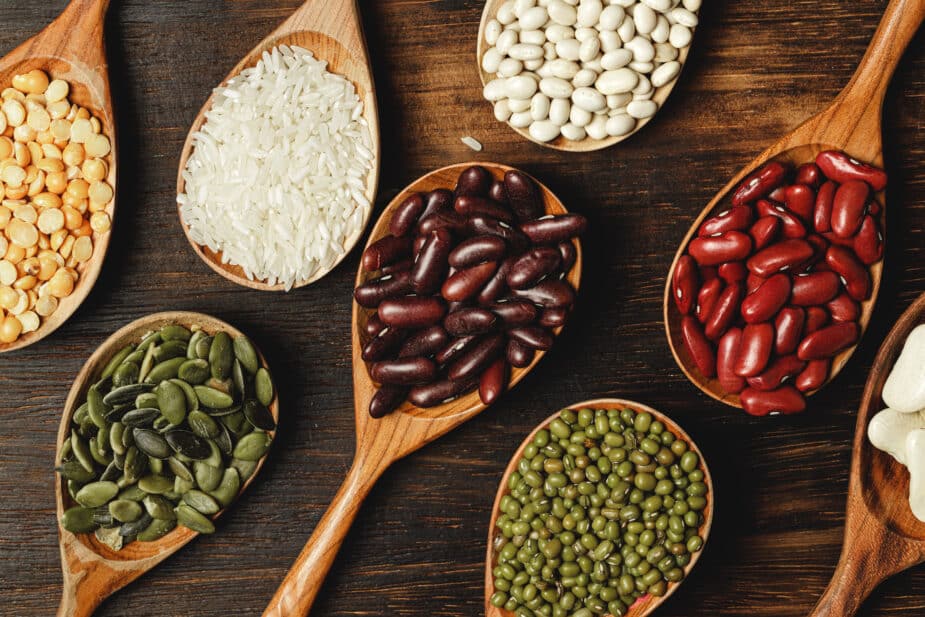
You know they’re good for your heart and your GI tract, but a regular dose of these may “bean-a-fit” your mood too!
Beans are rich in fiber, magnesium, the hormone tryptophan, and B vitamins, all of which can play a role in our mood.
Fiber helps in 2 ways. First, it’s prebiotic, which we talked about earlier. Prebiotics are food for all the healthy bacteria in our GI tract. Those bacteria are essential for making the hormones that help our mood.
Second, fiber helps slow down digestion which keeps our blood sugar stable and gives us a constant supply of energy. So no more energy lows that can lead to a low mood!
B vitamins help increase our mood by regulating some of the neurotransmitters we’ve talked about before including serotonin, GABA, and dopamine all of which play a role in our mood.
So it’s all well and good that these little guys are nutrient-rich, but is there really any link showing that a serving of beans can give your mood a boost? There is!
A recent study compared the diets of people with depressive symptoms compared to those without any symptoms. Along with a higher intake of fruits and vegetables, those who ate beans compared to those who didn’t have a much lower risk of depressive symptoms.
While we can’t say for sure it was the beans alone that had the impact, certainly, beans are known to help reduce inflammation and support a healthy gut. They are another potential good mood food!
Are There Foods You Should Avoid or Limit?
While there are many foods that support a good mood, there are some that may have a negative impact on your brain and your mood as well. While you don’t need to avoid them completely, keeping the levels low and enjoying them just occasionally may just help your mood.
Sugar
Too much sugar can skyrocket your blood sugar and then send it crashing down. You get a fast pick me up and then a sugar low kicks in. Kinda like how you felt after that big plate of pancakes!
Keeping your blood sugar a bit more steady with balanced meals can also help prevent highs and lows.
Fried Foods
Aside from not being good for your waistline, a diet high in fried foods can weigh down your mood too. Now, a once-in-a-while treat is likely not going to bring on the blues, but eating too many fried foods too often might lead to increased feelings of anxiety and depression.
Fried foods can increase inflammation in our bodies, including our brains, and interfere with our gut microbiota. Yes, I know, I’m back to our talking about your GI tract, but hopefully, you’re seeing a trend here. Too many fried foods might just interfere with all the good work those healthy bacteria are doing.
So, am I telling you to cut out all fried foods? Certainly not. I’m a french fry lover and fully intend on continuing to enjoy them once in a while! But, if you are someone who eats fried food regularly, it might be worth it to keep swapping them out for something else.
If you need a crunch, try some nuts and seeds for a snack, swap the french fries for a baked potato or rice pilaf, or add an extra serving of vegetables on the side instead of the starch. Your mind and your waistline will thank you!
Alcohol
So what about alcohol? While some alcohol, like red wine, might have some health benefits, too much can cause a lot of issues, especially for your mood.
Yes, a drink can make you feel relaxed and calm after drinking it but too much might actually bring you down.
Alcohol is really a depressant and heavy drinkers have been found to have a higher tendency to have depressive symptoms. It can also interfere with getting a good night’s rest, which can also lead to a low mood and low energy levels the next day.
The best guidance for alcohol consumption is to stick to no more than 1 drink a day for women and 2 for men.
Key takeaways
Yes, good food often leads to a good mood! While I listed 10 foods that lead to a good mood, an overall healthy diet that is rich in fruits and vegetables, whole grains, and lean meats including seafood, nuts, beans, and dairy products is your best bet for overall health and a good mood!
All of these foods contain nutrients that help stimulate the neurotransmitters in our brains and GI tract that regulate our moods. So load up on those good-mood foods and enjoy some treats occasionally.
Download this free mood-boosting snack list and give your mood a boost today!

